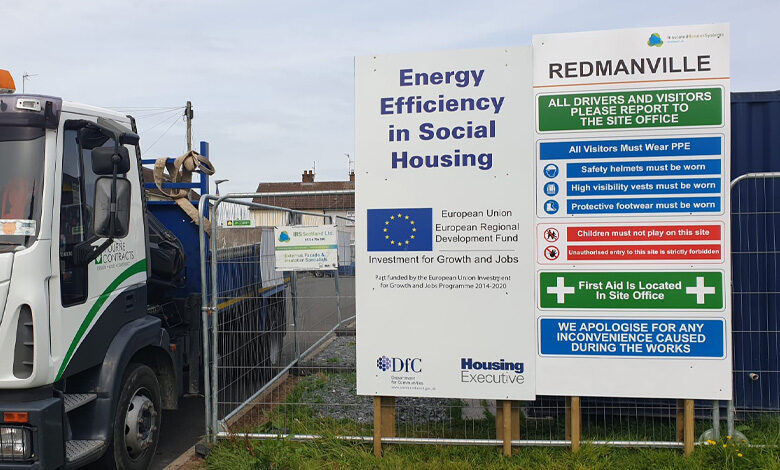‘Concerted action’ needed for housing decarbonisation

The Climate Change Commission (CCC) states that buildings in Northern Ireland will need to decarbonise by 33 per cent overall by 2030 from 2020 levels.
The CCC’s advice report, The Path to a Net Zero Northern Ireland, notes that the 24 per cent decrease seen in emissions since in 1990 “comes largely from a fall in buildings emissions in the early 1990s”, as well as other sectors in the 2000s, but also notes that buildings emissions are up 1 per cent since 2009. To be on track for the CCC’s ‘stretch ambition’, which would see Northern Ireland decarbonise by 93 per cent overall rather than the legally binding 100 per cent, emissions from the buildings sector – which accounted for 3MtCO2e in 2020 – would need to fall by 33 per cent from 2020 to 2030.
While the buildings sector is not solely made up of homes, the advice report also states that by 2030 for all homes off-gas grid and 2033 for all homes on-gas grid, all new heating appliance installations should be zero carbon if the 33 per cent and 93 per cent reductions for 2030 and 2050 respectively are to be met. Under the CCC’s balanced pathway, which would reach 83 per cent decarbonisation overall by 2050, it is recommended that the rate of residential buildings decarbonisation be slowed down to match the UK Tailwinds pathway. Buildings emissions in Northern Ireland were found to fall much faster than in England due to the disparity in homes off-gas grid (circa 65 per cent in Northern Ireland compared to 12 per cent in England), but the CCC warns that “scaling up low-carbon heat so quickly in Northern Ireland could have issues with local workforce skills and supply chains”.
In November 2022, the Housing Executive published its intentions on decarbonising its housing stock, with a retrofit programme to increase energy efficiency by 2030 and a 23 per cent reduction in carbon emissions up to 2030/31 targeted.
As Northern Ireland’s first carbon budget period has already begun, the CCC notes that a step change “must begin immediately”. For the buildings sector, this entails “concerted action” such as the rendering of all newly constructed homes as zero-carbon “as soon as possible”, with no later requirement for retrofit. The CCC states that the achievement of new heating appliances being zero-carbon for off-gas grid homes by 2030 and 2033 for on-gas grid homes would necessitate the “necessary strengthening of electricity networks”. Such moves would have massive implications for wider infrastructure and be “unlikely to be compatible with further extension to the Northern Ireland gas network”.





